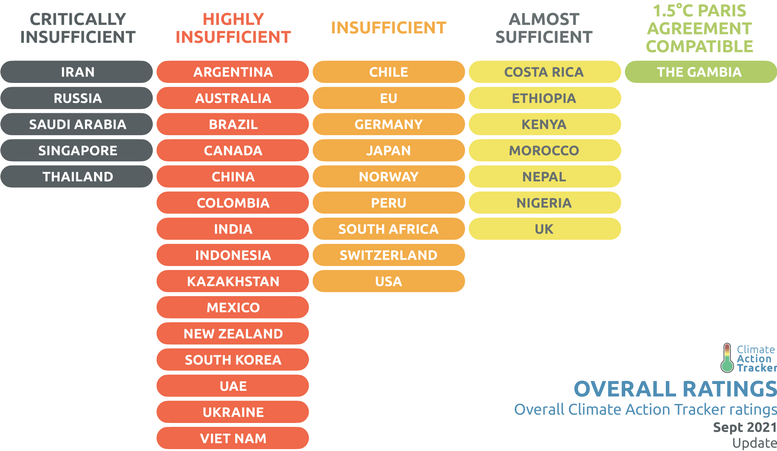Analysis: Despite “Code Red” on climate, target update momentum at a standstill
Press release
The momentum on updating 2030 targets for climate action has stalled since May, with no major emitters putting forward stronger climate targets, and the 2030 emissions gap has barely changed, according to new analysis released today by the Climate Action Tracker.

Only one country - The Gambia - is rating as having overall climate action that is consistent with the Paris Agreement 1.5˚C warming limit according to the CAT’s newly-updated rating method.
“In May, after the Climate Leaders’ Summit and the Petersburg dialogue, we reported that there appeared to be good momentum with new climate action commitments, but governments then had only closed the emissions gap by up to 14 percent,” said Niklas Höhne, of NewClimate Institute, a CAT partner organisation.
“But since then, there has been little to no improvement: nothing is moving. Governments have now closed the gap by up to 15%, a minimal improvement since May. Anyone would think they have all the time in the world, when in fact the opposite is the case.”
The CAT has updated all of the country ratings under its new ratings system, launched today, where it now gives ratings on a wide range of actions: an overall rating, the domestic target, policies and action, fair share, climate mitigation finance (either on providing mitigation finance, or detailing what international support is needed), and land use and forestry (where relevant). The CAT has also begun rating net zero targets.
- Of the 37, countries assessed by the CAT only one - The Gambia – is rated as having overall climate action that is 1.5°C Paris Agreement compatible.
- In another seven, overall climate action is nearly sufficient, meaning they are not yet consistent with the Paris Agreement’s 1.5°C temperature limit, but could be with moderate improvements. Three countries, the EU, Germany and the US, have significantly updated their targets with a raft of new policies, and while the UK’s domestic target is 1.5˚C compatible, its policies and international support don’t match.
- This leaves three quarters of the countries the CAT assesses with significant gaps in climate action.
“Of particular concern are Australia, Brazil, Indonesia Mexico, New Zealand, Russia, Singapore, Switzerland and Viet Nam: they have failed to lift ambition at all, submitting the same or even less ambitious 2030 targets than those they put forward in 2015. These countries need to rethink their choice,” said Bill Hare, CEO of Climate Analytics, a CAT partner.
“The IPCC has given the world a ‘code red’ warning on the dangers of climate change reinforcing the urgent need for the world to halve emissions by 2030. An increasing number of people around the world are suffering from ever more severe and frequent impacts of climate change, yet government action continues to lag behind what is needed. While many governments have committed to net zero, without near-term action achieving net zero is virtually impossible,” said Hare.
On the policy front, coal remains an issue, with China and India both with huge coal pipelines. South East Asia is also of concern, with Indonesia, Viet Nam, Japan and South Korea still planning to forge ahead with the most polluting of fossil fuels.
Gas is still falsely being promoted as a “bridging fuel” and needs to be phased out as soon as possible, yet Australia, the world’s largest gas exporter, is still pouring cash into expanding gas. Even the EU still has plans to commit funding to new gas infrastructure.
“Gas is a fossil fuel, and any investment into gas today risks becoming a stranded asset. And while interest in green hydrogen has grown exponentially, there is still a large number of hydrogen projects in the pipeline where it’s produced from gas. Hydrogen produced from gas still produces carbon, and is inconsistent with reaching net zero,” said Hare.
Stay informed
Subscribe to our newsletter